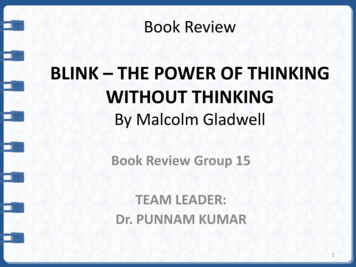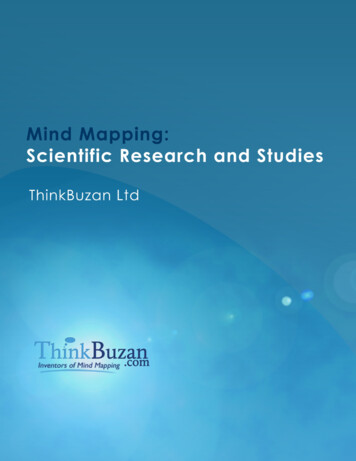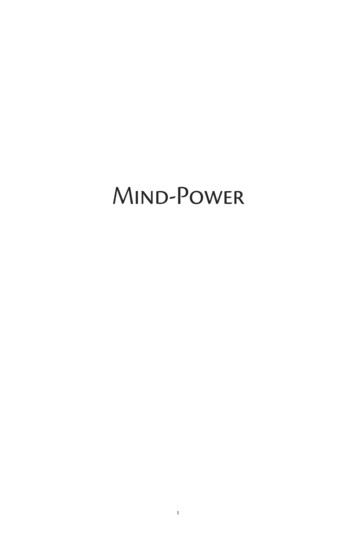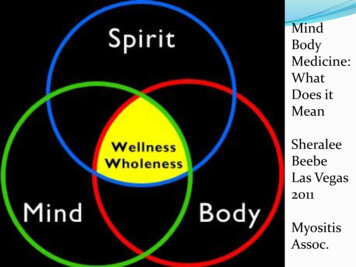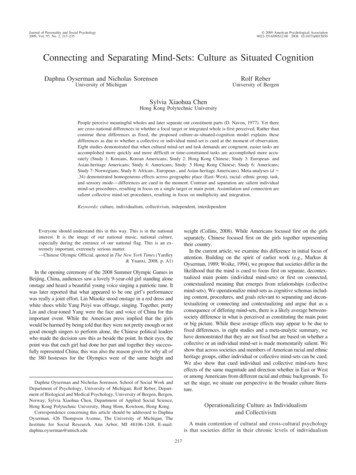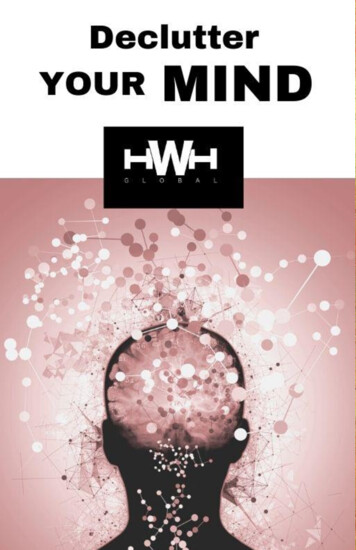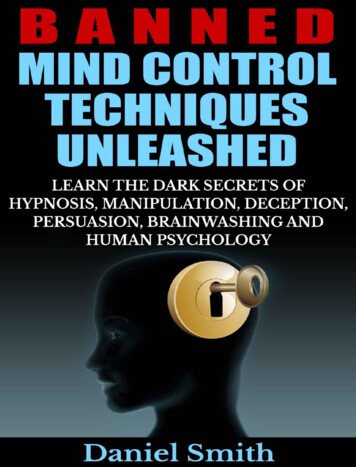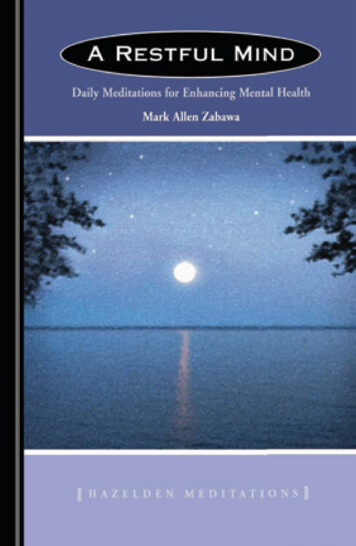
Transcription
A Restful Mind
Hazelden MeditationsA Restful MindforDaily MeditationsEnhancing Mental HealthMark Allen Zabawa
HazeldenCenter City, Minnesota 55012hazelden.org 2010 by Hazelden FoundationAll rights reserved. Published 2010Printed in the United States of AmericaNo part of this publication may be reproduced, stored in a retrievalsystem, or transmitted in any form or by any means— electronic, mechanical, photocopying, recording, scanning, or otherwise— withoutthe express written permission of the publisher. Failure to complywith these terms may expose you to legal action and damages forcopyright infringement.Library of Congress Cataloging-in-Publication DataZabawa, Mark Allen, 1960– A restful mind : daily meditations for enhancing mentalhealth / Mark Allen Zabawa.p. cm. — (Hazelden meditations)Includes index.ISBN 978-1-59285-752-4 (softcover) 1. Meditation—Therapeutic use. 2. Mental health. I. Title.RC489.M42Z33 2010615.8'52—dc22 200904978814 13 12 11 10 1 2 3 4 5 6Cover design by David SpohnInterior design by David SpohnTypesetting by BookMobile Design and Publishing Services,Minneapolis, Minnesota.
On your journey ahead you will find yourself discovering limitations that you will grow to acceptand possibilities far reaching your imagination. Youwill learn to accept and cope with your illness andrealize that it does not define you as an individual,but rather it is one part of your true being.— Mark Allen Zabawa
F o r e w o r d Recovery from mental illness is a process. It meanstaking care of ourselves each and every day— spiritually, emotionally, and physically. It means actively working to make change. It means makinghealth and stability a priority. Although we each recover in our own way and on our own schedule, weall need help, and help comes in many forms.Some of us go to therapy, for example. Many ofus use prescription medication under the care of adoctor. Some of us attend regular support groupmeetings and work with mentors or sponsors.These and the many other ways we take care ofourselves are sometimes called the tools of recovery.We choose the ones that work best for us.Millions of people in recovery from various illnesses have used a tool called bibliotherapy, whichmeans reading to promote growth and understanding. A meditation book, like this one, is a commonform of bibliotherapy. Because it can help with immediate issues, it works like an aspirin. Becauseit promotes psychological and spiritual growth, itworks like a vitamin. Like other recovery tools, itworks best when used on a regular basis.A Restful Mind is a testament to experience,strength, and hope. Its daily meditations speak toall of us, regardless of our diagnosis. Topics include having setbacks, reducing anxiety, taking medication,
asking for help, experiencing inpatient treatment,and being gentle with ourselves. Each one-pagemeditation has three parts: a reflection, a questionto promote awareness, and a thought for the day. Ithelps to read each meditation more than once.We read a meditation book like this one formany reasons. It can offer reassurance. It can helpus feel normal. It can help us see where we’ve beenand where we want to go. It can help us think moreclearly and understand ourselves better. Though notevery topic may seem to apply to our situation onany given day, we can still gain new insights and perspectives on mental illness from the ideas and experiences of others.Like doing anything new, reading this book mightfeel strange at first. Be sure to give it a fair chance.Use it to start your day or end your day. Or carry itwith you and read it when you have time. The ideais to make reading this book a daily ritual on yourrecovery journey. The goal is growth, support, andunderstanding.Reading a meditation is like listening to someonewho knows us and accepts us even though we havenever met. With time, may A Restful Mind become acomfort, a companion, and a touchstone for you.—Tim Mc, author of Today I Will Do One Thing
A Restful Mind
j a n u ary
J a n u a r y1 A New Year, a New BeginningAs the new year begins, we may be tempted to lookback and focus on what we fell short of accomplishing,rather than looking at all that we have accomplished.We may sense failure for not completing every taskwe began. Or we may feel let down because some ofwhat we wanted to have happen did not.Let us be gentle with ourselves, however, for thisis a new year and a new beginning. Let us look toour past for wisdom and guidance rather than failure and someone to blame. Let us look at what weachieved rather than at what failed to happen.As we begin the new year, let us move forwardwith faith, courage, and the willingness to learnfrom each of our experiences. Let us focus on opportunities. But most of all, let us be true to ourselves and our recovery.Am I stuck on last year or can I begin the new yeartoday with faith and an open mind?Thought for the DayToday is a new beginning.
j a n u a r y2 Mental Illness Is Not a WeaknessMental illness is not a moral or psychological weakness. We are not weak-willed, defective, or underdeveloped. Mental illness is a biochemical illnessthat can affect anyone at any time.As we continue our journey, it is important to remember that our illness has nothing to do with ourcharacter, personality, economic status, willingness,nor any other mythological cause.Today, am I clear about who I am and the source ofmy illness?Thought for the DayI have an illness, not a weakness of the mind or soul.
J a n u a r y3 SuccessWe often think that success is based on how muchmoney we have or what we possess or our status inthe community. But for those of us with a mentalillness, success is more often defined by our abilityto cope with our illness.Many of us have turned what seemed an impossible situation into a new way of living. Some of ushave returned to work. Most of us have gained abetter understanding of ourselves. Many of us haveachieved some goals and dreams.On our journey we will have many opportunities for success. If today we have begun to manageour illness and take back our life, we have alreadytasted it.Today, do I realize that success is already a part ofmy life?Thought for the DayI can succeed day after day by learningto cope with and manage my illness.
J a n u a r y4 Our Lives Can ChangeOur lives can change if we let them. Once we havebeen lifted from the depths of despair and are nolonger prisoners of our illness, we will have opportunities to achieve things we once thought impossible. We will find the courage and strength to copewith each day. Hopelessness will be replaced withhope and faith. We will learn that we are not aloneand that others are willing to help us. We will cometo know ourselves and accept ourselves as we are— not merely for what we think we should become.We will know serenity and become at peace withthe world around us.Do I believe my life can change today? Am I willingto let positive changes happen?Thought for the DaySometimes positive change is an act of will,and sometimes it’s just letting good things happen.
F e br u ary
F e b r u a r y1 Selective ListeningKnowingly or not, some of us with a mental illnesshave developed selective listening. We hear whatwe want to hear and sometimes twist others’ wordsto match our desires. For example, if we were toldthat we would have to take our medication for along time, we interpreted that to mean we wouldbe able to stop taking it whenever we felt a little better. Selective listening may give us some shortterm comfort, but in the long-term it is dangerous.As our recovery progresses, we need to learn tolisten to what people say to us, not to what we wantthem to say. This may be difficult at first. Truth andreality can be painful. But our recovery will go nowhere if we base it on anything other than the truth.Do I practice selective listening today or do I listenwith an open heart and mind?Thought for the DayAs painful as it may be,the truth always supports my recovery.
F e b r u a r y2 H.A.L.T.When we find ourselves too hungry, too angry, toolonely, or too tired, we put ourselves at physical,emotional, or spiritual risk. Our body’s chemistrychanges and we can lose our balance.For someone with a mental illness, this can haveserious consequences. We need to restore our balance.When we are hungry, we can eat. When we’reangry, we can ask ourselves why, cope, and, if necessary, make a change. When we’re lonely, we canreach out to others. When we’re tired, we can rest.Do I take care of myself today when I am hungry,angry, lonely, or tired?Thought for the DayH.A.L.T. is the formula for balance.
F e b r u a r y3 No Matter What, We’ll Be OkayIf we remember nothing else from our journey thus far,let us always remember in our hearts that, no matterwhat, we will be okay. That no matter where we mayfall, or how often, we’ll be okay. That no matter howmany times we may have to start over, we’ll be okay.That no matter what material possessions or amountof money we may lose, we’ll be okay.We may not have what we would like or what wethink we should have, but we’ll be okay because wehave another chance. And most importantly, we stillhave our Higher Power and we have ourselves.Today, do I know that, no matter what, I’ll be okay?Thought for the DayWhen I remain true to my Higher Power and to myself, Iwill always be okay, no matter what.
F e b r u a r y4 Each Day a New LessonEach day is a new step on our journey, with newlessons to be learned. Lessons for emotional and spiritual growth. Lessons in moral character. Lessonsthat lead us to acceptance and teach us that judgingourselves and others is not our job, but the work ofour Higher Power. Lessons that teach us about ourillness, help us heal, and help us cope with our illness, one day at a time.Today, am I willing to learn any lessons that aregiven to me?Thought for the DayLet me learn the lessons of todayso I am prepared for tomorrow.
Mark Allen Zabawa is a counselor and patientmonitor for a large hospital. He suffers from bipolardisorder and has led dozens of support groups forthose with mental health problems. He is the authorof Living with Chronic Pain One Day at a Time.
Hazelden, a national nonprofit organization foundedin 1949, helps people reclaim their lives from thedisease of addiction. Built on decades of knowledgeand experience, Hazelden offers a comprehensiveapproach to addiction that addresses the full rangeof patient, family, and professional needs, includingtreatment and continuing care for youth and adults,research, higher learning, public education and advocacy, and publishing.A life of recovery is lived “one day at a time.”Hazelden publications, both educational and inspirational, support and strengthen lifelong recovery.In 1954, Hazelden published Twenty-Four Hoursa Day, the first daily meditation book for recovering alcoholics, and Hazelden continues to publishworks to inspire and guide individuals in treatmentand recovery, and their loved ones. Professionalswho work to prevent and treat addiction also turnto Hazelden for evidence-based curricula, informational materials, and videos for use in schools, treatment programs, and correctional programs.Through published works, Hazelden extends thereach of hope, encouragement, help, and support toindividuals, families, and communities affected byaddiction and related issues.For questions about Hazelden publications, pleasecall 800-328-9000or visit us online at hazelden.org/bookstore.
ing. A meditation book, like this one, is a common form of bibliotherapy. Because it can help with im-mediate issues, it works like an aspirin. Because it promotes psychological and spiritual growth, it works like a vitamin. like other recovery tools, it works best when used on a re


